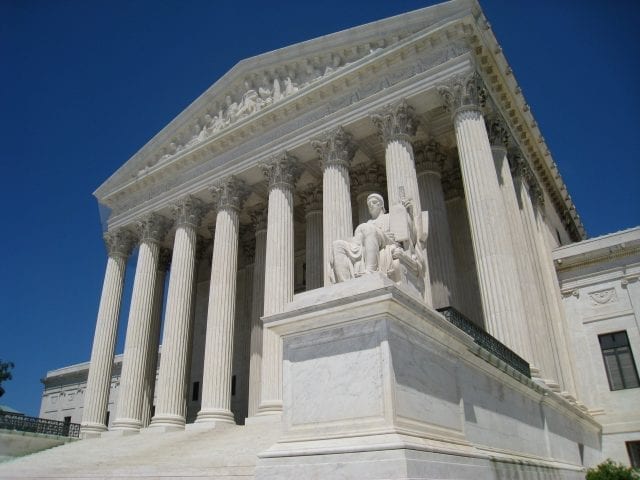“The Government argument … implies that it could deport and incarcerate any person, including U.S. citizens, without legal consequence, so long as it does so before a court can intervene,” wrote Justice Sonia Sotomayor.
The U.S. Supreme Court has ordered the Trump administration to immediately “facilitate” the return of Kilmar Armando Abrego Garcia, a Maryland man who was mistakenly detained, deported, and sent to a notoriously violent prison in El Salvador.
According to National Public Radio, the ruling constitutes a rare victory for activists pushing back against the president’s immigration orders. However, the justices did remand the case to lower court, asking a district judge to clarify an element of her decision “with due regard for the deference owed to the Executive Branch in the conduct of foreign affairs.”
Since taking office in January, immigration enforcement remains among President Trump’s top priorities. His administration has repeatedly defied court orders and sought to deport international students and legal permanent residents who participated in pro-Palestine protests or otherwise criticized the United States’ relationship with Israel.
But, in Abrego Garcia’s case, the White House has admitted that it made a mistake.
Abrego Garcia, a citizen of El Salvador, initially entered the United States without legal status. He lived in Maryland for about 15 years. In 2019, Abrego Garcia was granted protection from deportation to El Salvador, with a court citing credible concerns for his safety were he to be returned.
National Public Radio notes that Abrego Garcia’s 2019 proceedings were predicated on accusations that he was a member of MS-13, a violent and predominately Salvadoran street gang.
However, he was allowed to remain in the United States and granted protection from deportation after a judge ruled that there was insufficient evidence to show that Abrego Garcia was actually a member of MS-13.
Since then, Abrego Garcia has continued to live and work, with legal authorization, in Maryland.
In March, though, Abrego Garcia was on his way home from work in Baltimore when he was pulled over by Immigration and Customs Enforcement agents. With Abrego Garcia’s 5-year-old son in the backseat, officers claimed that his legal “status had changed.” He was arrested on the spot; his wife, an American citizen, had to travel to the site to prevent ICE from turning the boy over to Child Protective Services.

Several days after his arrest, Abrego Garcia was flying back to El Salvador, chained next to alleged members of the Venezuela-based Tren de Aragua gang.
Abrego Garcia’s family has contested his deportation. The Justice Department, for its part, conceded in court filings that the deportation was the result of an “administrative error.”
Last Friday, U.S. District Judge Paula Xinis ordered that Abrego Garcia be returned to the United States as quickly as reasonably possible, setting a deadline of 11:59pm on Monday, April 14.
The Trump administration asked an appeals court to pause Xinis’s order; the appeals court declined, with Reagan-appointed Judge J. Harvie Wilkinson slamming the government’s negligence.
“There is no question that the government screwed up here,” he wrote. “The government here took the only action which was expressly prohibited.”
“One would also expect the government to do what it can to rectify it,” Wilkinson said. “Most of us attempt to undo, to the extent that we can, the mistakes we have made. But, to the best of my knowledge, the government has not made the attempt here.”
In a further appeal to the Supreme Court, the Trump administration alleged that the Justice Department lawyer who admitted the error was not speaking on behalf of the White House or any other authority. The administration, notes NPR, has instead doubled down, maintaining that Abrego Garcia was and is a member of MS-13.
Attorneys for the government also complained that, no matter what mistakes this administration may make, a district court judge like Xinnis cannot be allowed to “seize control over foreign relations, treat the Executive Branch as a subordinate diplomat, and demand that the United States let a member of a foreign terrorist organization into America.”
In its own ruling, the Supreme Court reinforced Xinis’s ruling, but asked that she clarify the executive branch’s authority over foreign relations.
“The order properly requires the Government to ‘facilitate’ Abrego Garcia’s release from custody in El Salvador and to ensure that his case is handled as it would have been had he not been improperly sent to El Salvador,” the court wrote in an unsigned order.
None of the justices dissented the orders, while the court’s more liberal members appeared critical of the government’s claims.
“The Government argument, moreover, implies that it could deport and incarcerate any person, including U.S. citizens, without legal consequence, so long as it does so before a court can intervene,” wrote Justice Sonia Sotomayor, whose opinion was signed by two of her colleagues.
Sources
Deadline looms in case of Maryland man’s wrongful deportation to El Salvador
Supreme Court says Trump administration must facilitate return of deported Maryland man
Supreme Court says Trump officials should help return wrongly deported Maryland man


Join the conversation!